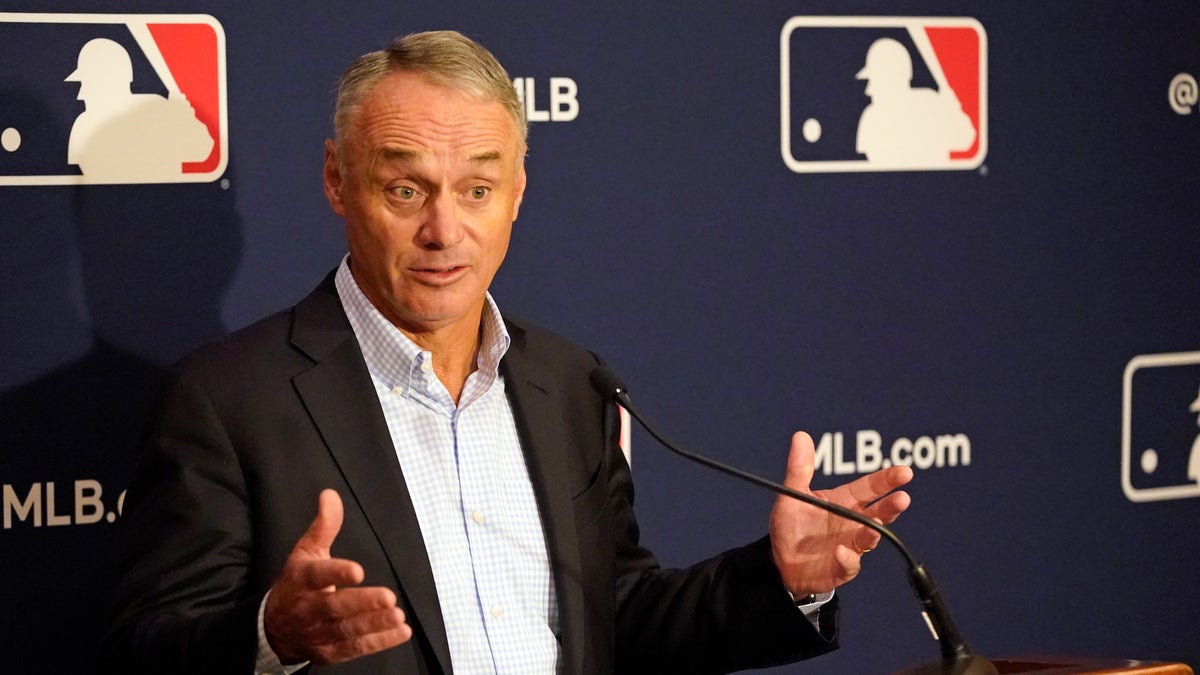MLB keeps spring camps on hold, league OKs nominate batter for NL
ORLANDO, Fla. — Baseball Commissioner Rob Manfred said spring training remains suspended due to a managerial lockout and his goal is to complete an opening-day labor contract. scheduled for March 31.
As the second-longest work stoppage in baseball history stretches into its 71st day, Manfred said the teams will make a “good faith and positive proposal in an effort to move the process forward” when the negotiations with the players’ association will resume on Saturday. to be only the fifth session of economic negotiations since the expiration of the five-year labor contract.
“I’m an optimist and I believe we’ll have a deal in time to play our regular schedule,” Manfred said Thursday after a three-day owners’ meeting. “I view missing games as a disastrous outcome for this industry, and we are committed to reaching an agreement with the aim of avoiding this.”
Spring training was scheduled to start on February 16.
“The status of spring training hasn’t changed at this time,” Manfred said. “We’re going to have a conversation with the MLBPA about the schedule. We understand where the schedule is, but until we have that conversation and until we see how this Saturday session goes, there is no change.”
Each time an agreement is reached, at least three weeks of training are necessary.
“We thought 20, 21 days, whatever we had in 2020 was a problem for us,” Manfred said. “The injury data supports that idea. We would like to be 28. I try not to be hard and fast. But we think four weeks makes more sense.”
Before training can begin, additional days are needed to prepare.
“We have some logistics that would have to be managed between a deal and the opening of the camps, the most important of which is getting the players to where they need to be,” Manfred said. “They need to ratify and we need to ratify and we won’t open until it’s ratified. But these two activities can take place at the same time, simultaneously. It’s a few days. Everything should be done in a few days.
Manfred confirmed that the testing of players for steroids stopped when the lockdown started.
“Our legal authority to perform drug testing expired with the expired agreement,” he said. “It is a matter of concern. Labor disputes are matters of concern. This is another caused by the dispute.
Manfred also said teams have no plans to use players with minor league contacts to play major league exhibition games.
The players, led by former All-Star first baseman Tony Clark, are angry at a payroll drop from the previous contract in what they say is a lack of competition from some teams and what they allege is service time manipulation.
The union has proposed allowing accumulation of service time by recruits for special awards and achievements, a draft lottery, expanding arbitration eligibility to its pre-1986 level, and decrease in revenue sharing.
MLB says it will not increase arbitration eligibility or decrease revenue sharing.
The parties disagree on minimum wages and the size of a lottery scheme, and they are also far apart on luxury tax thresholds. The union says MLB wants to raise tax rates, while Manfred says MLB has not offered any meaningful change, and although the parties agree to establish a bonus pool for pre-arbitration players , they differ enormously on the amount.
MLB would expand the playoffs from 10 teams to 14, while the union is proposing 12.
Manfred said MLB agreed to extend the designated hitter to the National League and eliminate draft compensation for free agents, an issue that led to a 50-day midseason strike in 1981.
Based on minimum wages and bonus pool. Manfred said the players would receive over the five-year term of a deal “hundreds of millions of dollars,” plus more value from the DH expansion and the elimination of free agent pay.
“We have offered a deal that is better in every way than the expired contract,” Manfred said. “All in all, the proposals we have made would move the deal decisively in the direction of the players. Where clubs have been and remain reluctant to move is in response to player offers that we believe will undermine the competitive balance of our game.”
MLB requested last week that a federal mediator join the talks, but the union rejected the offer.
Some players vilified Manfred for his role.
“What someone says on social media doesn’t really affect my thinking,” he said. “It’s my responsibility to do everything we can to get a deal the industry can live with and keep the game on the pitch, and we’re trying to do that.”


Comments are closed.